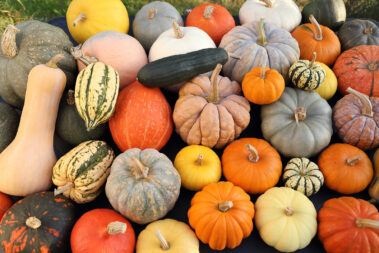Strawberries picked at the peak of freshness don’t last nearly as long as we wish they would. To get the most out of your harvest or produce section score, here are the best ways to store strawberries for the short term and long term.
Table of Contents
How to Store Strawberries
Fresh strawberries don’t last very long on the counter. If you have a big harvest like I typically do at the end of the season, then you’ll need some alternative methods for storing them.
Here are two options that work well if you’re still trying to figure out what to do with all those delicious berries.
Short Term Storage
If you plan to use up your strawberries within a few weeks, you can store them for the short term in the fridge.
But before you take your fresh strawberries from the garden (or farmers market, or store) and pop them in the fridge, there’s one thing you absolutely have to do first—wash them!
Washing strawberries using our favorite method—vinegar—not only gets all the bugs, dirt, and (if you’re using store-bought) pesticides off, but it also helps preserve strawberries so they last longer. That’s because vinegar also kills off bacteria and fungi that spoil strawberries.
Once you have your strawberries washed, simply dry them, and place them in a container with a loose lid. I typically use a glass dish lined with paper towels and covered with a clean dishrag.
Fresh strawberries cleaned and stored in the fridge will typically last around three weeks.
Long Term Storage
If you have strawberries coming out of your ears, you’re probably in need of a long-term storage solution. In this case, I recommend freezing them or dehydrating them.
How to Freeze Strawberries
If you plan to use your strawberry haul to make smoothies, other frozen or blended treats, or to make jam… eventually… then freezing them is a great storage option.
This is easy enough to do.
Start by washing the strawberries as outlined in the link above, and then blot them dry.
Cut the tops off, then spread them out over a cookie sheet lined with parchment paper or wax paper. Then stick the sheet in the freezer for about six hours, or until they are rock hard.
Transfer the frozen berries to an airtight container that is freezer-safe. Place the container back in the freezer.
Frozen berries will last about six months in a standard freezer or up to a year in a deep freezer.
How to Dehydrate Strawberries
One great way to store strawberries so they last a long time is to dehydrate them.
If you have a dehydrator, this is super easy to do. It’s also possible if your oven can go down to 100 degrees.
Start by thoroughly washing your strawberries. Pat them dry, then remove the stems and cut them into slices about 1/4 inch thick.
Arrange the slices in a single layer on your dehydrator tray. Dehydrate at 135 degrees for about 6 to 12 hours. You’ll know they’re done when they tear in half without any visible moisture in the center.
Dehydrated strawberries can be stored in a bag on the counter if eaten within a few weeks. If you want to store them longer, place them in a mason jar with an oxygen absorber and the lid tightly closed or vacuum seal them. When stored this way, they can last up to a year.
Expert Tip: Don’t Pre-Wash Freshly Picked Strawberries
A lot of die-hard gardeners will warn against washing berries like strawberries before you’re ready to eat them.
There is some logic to this advice. The outside of fruits contain special compounds that help to keep them from spoiling too soon. If you wash your berries, you’ll be removing much of this protective layer.
For this reason, it’s best to not pre-wash freshly picked strawberries. Instead, place them on a paper towel inside a container with a loosely fitting lid, and put them in the fridge. Only once you’re ready to eat them should you rinse or wash them.
But the story changes when it comes to store-bought strawberries.
These are likely to have already been washed at the farm or packaging facility. That means the protective layer is already gone and the clock has already started ticking down to their expiration.
In this case, the best thing you can do is pre-wash the berries in diluted vinegar. The acid in the vinegar will kill the bacteria and fungus that cause premature rot and help preserve the already-washed berries for longer.
Use Up Your Strawberries Before They Go Bad
There are plenty of wonderfully easy ways to use up excess strawberries. You don’t need specific recipes for most of these, you just have to get a little creative.
Smoothies
By far the easiest way to use strawberries is to throw them in your morning (or afternoon) smoothie.
Strawberries are loaded with vitamins and minerals you need, including manganese, vitamin C, folate, and potassium. They are also chock full of antioxidants your body uses to fight inflammation and free radicals. All this is to say, there’s no reason not to include strawberries in your daily smoothie!
If using fresh strawberries, be sure to add a little ice along with the berries. For frozen, skip the ice.
Then add your favorite non-dairy milk, some healthy greens, and something to add a bit of silky smoothness (banana or avocado). For an added protein boost you can also add plant-based protein powder or vegan Greek yogurt.
Healthy Popsicles
Another fun option for using up strawberries is to freeze them into a deliciously cool and sweet treat. This is an especially good option if your end-of-summer comes with an unseasonal heat wave.
I like to chop up my fresh strawberries and mix them with vegan yogurt, then pour the mixture into a silicone popsicle mold. Alternatively, you can blend your frozen strawberries with yogurt, milk, honey, and other flavors to make popsicles.
This cold treat is also a great option for kids.
Strawberry Jam
If you’re handy in the kitchen, making your own strawberry jam is always a wonderful option worth considering.
For those without canning experience, I recommend adapting our awesomely easy blueberry-chia jam recipe to make no-canning-needed strawberry jam.
If you want strawberry jam you can enjoy all winter, then canning is a must. Luckily, there are plenty of simple recipes out there you can follow. This one from Hebbars Kitchen is easy and contains less sugar than most.
FAQ
Should strawberries be stored in an airtight container?
No, strawberries do best when stored in a container that allows some airflow. This prevents moisture from building up, which causes berries to rot faster. But too much airflow can dry fresh berries out. The best solution is to place them in a container with a clean rag laid on top.
Is it better to store strawberries cut or whole?
It is best to store strawberries whole, with the green part intact. This is because whole berries have less surface area that can be affected by oxygen and bacteria. Whole strawberries also better hold onto moisture than cut berries, which means they don’t dry out as fast.
Do strawberries last longer in a glass jar?
No, in my experience strawberries do not last longer in a jar. Not unless that jar is lined with paper towels and has a loosely fitting lid. But you can accomplish the same thing using a glass or plastic container.
Our Favorite Strawberry Recipes
Can’t get enough strawberries? Or just have way too many to blend into smoothies? Here are some of my favorite recipes that feature strawberry as the star.
- Vegan Chocolate Covered Strawberries – If you love chocolate as much as I do, you need this classic strawberry recipe made vegan.
- High Protein Baked Oatmeal – Sweet and tart strawberries meld perfectly with crispy spiced baked oatmeal in this breakfast winner.
- Strawberry Spinach Salad with Raspberry Vinaigrette – Hold tight to summer feelings with this delightfully bold and healthy salad.
- Raw Strawberry Chocolate Tarts – The perfect dessert for date night or me night.
- Strawberry Daiquiris – Impress everyone at your next get-together with these easy yet amazing daiquiris made with fresh strawberries, rum, and orange juice.
Can’t get enough strawberries? Make sure to sign up for our newsletter to get updated the next time we add a new strawberry recipe or how-to guide to our site.
Storing Strawberries the Easy Way
When it comes to storing strawberries for the short term, the easiest way is to wash them (if they’re from the store), dry them, and place them in a container lined with paper towels. Place a clean rag over the top and pop them in the fridge. For longer-term storage, you can freeze or dehydrate them.
Have more questions about storing strawberries or want to share your favorite berry recipe? Be sure to post in the comments section below!
- How to Pick the Perfect Watermelon For a Sweet Summer Treat - April 10, 2024
- Future Kind’s Foundations: A Multivitamin Made for Vegans - December 5, 2023
- Does Nutritional Yeast Go Bad? - November 28, 2023







